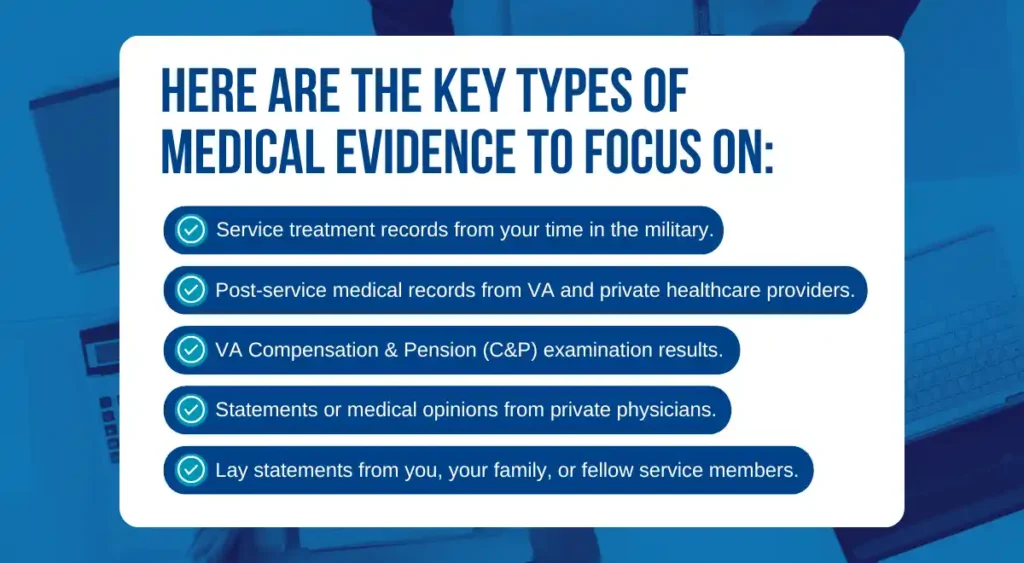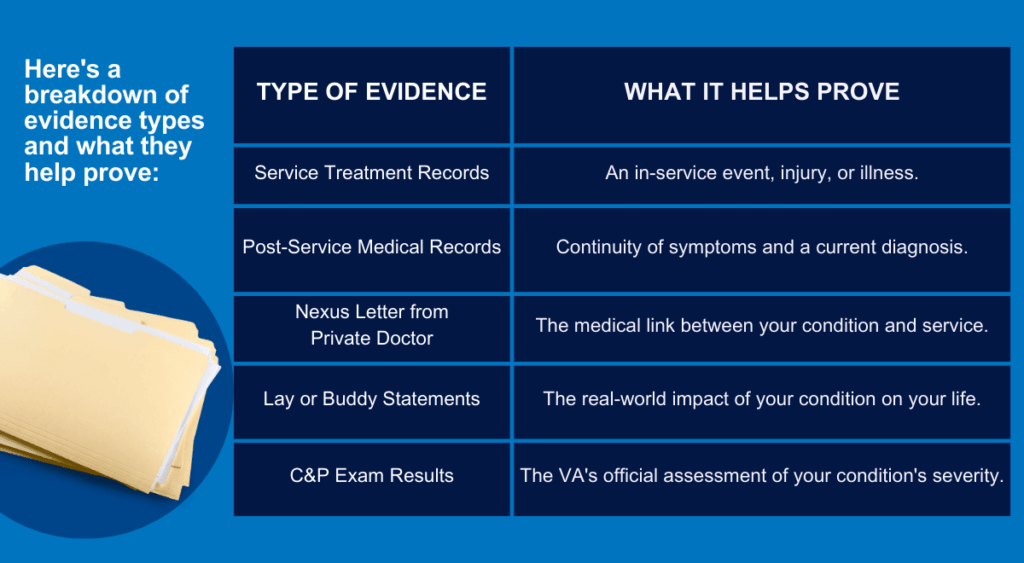Getting your health conditions connected to your military service is possible for veterans seeking the benefits they have earned. The answer to whether you can get service connection is often yes—but you’ll need strong medical evidence. Find out how to get these conditions connected to your service and build a successful disability benefits claim.

Why Medical Evidence Matters for Your VA Claim
The Department of Veterans Affairs (VA) requires solid proof to link your health issues to your time in the service. Without sufficient medical evidence, your disability claim may be delayed or denied. Think of this evidence as the fundamental support for your entire case file.
It’s not enough to simply have a diagnosis from a healthcare provider. The VA needs to see a clear and documented connection between your current medical condition and an event, injury, or illness that occurred during your military service. This is where many veterans face challenges in the claims process.
Strong evidence supports your claim and helps the VA make an accurate decision about your VA disability rating. The right documentation demonstrates the severity of your condition and its impact on your daily life. This ultimately influences the amount of disability benefits you may receive.
Types of Medical Evidence That Strengthen Your Claim
Not all medical documentation is created equal in the eyes of the VA. Some types carry more weight and provide a clearer picture of your health journey. Aiming to gather a variety of strong evidence can significantly improve the outcome of your VA claim.

Each document adds a piece to the puzzle of your health history. When combined, they can create a compelling argument for service connection that the VA is more likely to approve. We’ll review each of these evidence types in more detail.
Service Treatment Records: Your First Line of Defense
Your service treatment records (STRs) are often considered the most important piece of evidence. These are your official military medical records, documenting any health issues you experienced while on active duty. They provide a direct link to your time in service, whether you were in the Army, Navy, or Air Force.
Look for any mention of treatments, diagnoses, or complaints related to the condition you are claiming. Even minor notes can become crucial evidence. These records you’ve accumulated are the starting point for establishing an in-service event.
If you cannot locate your STRs or personnel records, don’t worry. You can request them from the National Archives. The VA can also assist in obtaining these vital documents, so it is worth the effort to track them down.
Post-Service Medical Records: Filling in the Gaps
Your health journey didn’t stop when you left the military, and your medical records shouldn’t either. Post-service treatment records show the progression of your condition over time. They help establish a continuous history of symptoms and care since your discharge.
It’s important to gather all relevant records from every one of your healthcare providers, including specialists, therapists, and primary care physicians. This collection of medical records online and offline helps demonstrate that the condition has persisted. This continuity of care is vital for your disability claim.
These records should include diagnoses, medical tests, prescribed medications, and notes from your appointments. They provide a timeline of your health, connecting the dots from your military service to your present-day severe impairment. All of this additional evidence helps build a stronger case.
VA Medical Examinations: The Official Assessment
The VA will likely schedule you for a Compensation and Pension (C&P) exam as part of the claim review. A VA-appointed clinician performs this examination to evaluate your condition and provide a medical opinion. This exam is a critical component of the VA disability claims process, so you should attend it.
Approach these exams with honesty and thoroughness. Describe your symptoms clearly and explain how they affect your ability to perform work-related activities and daily tasks. Do not downplay your symptoms, but avoid exaggerating, as the goal is to provide an accurate representation of your health.
The C&P examiner’s report will be added to your claim file and will heavily influence the VA’s decision. If you disagree with the examiner’s findings, you have the right to submit evidence to counter their opinion. A negative C&P exam is not necessarily the final step.
Private Physician Statements: A Powerful Ally
An opinion from your own doctor can be an incredibly powerful piece of evidence. This statement, often called a nexus letter, is written by a medical source to directly link your condition to your military service. The opinion of a specialist who has treated you for a long time can carry significant weight.
Your doctor should use specific language required by the VA. They need to state that your condition is “at least as likely as not” related to your service. This is the legal standard the VA uses to determine service connection.
Provide your doctor with your service medical records and other relevant documents so they can write a well-informed and detailed letter. A strong nexus letter from a trusted medical expert can be the deciding factor in your disability benefits claim. It helps establish a clear service-connected disability.

Lay Statements: Telling Your Story
Medical records don’t always capture the full impact a condition has on your life. That’s where lay statements, or “buddy statements,” can be very helpful. You can submit statements from yourself, your spouse, family members, or people you served with.
These personal accounts can describe how the condition began, how your symptoms have progressed, and how they affect your daily life and functional capacity. For example, a statement could describe changes in your personality for a mental health claim or physical limitations you now face. This personal evidence adds a human element to your VA claim.
Statements from fellow service members can corroborate an event that happened in service but wasn’t officially documented. These testimonies can fill in critical gaps in your official records. They provide a first-hand account that can be very persuasive.
Meeting the VA’s Medical Evidence Standards
The VA operates under specific guidelines when evaluating the evidence you submit. Understanding these standards can help you build a stronger disability claim. Your evidence needs to be both competent and credible.
Competent evidence comes from a source qualified to provide it, such as a doctor offering a medical opinion. Credible evidence is information that is believable and plausible. For your VA disability claim to be successful, you must show a current diagnosis and provide medical proof of a link to your service.
For some conditions, the VA offers a presumptive service connection. This applies to certain illnesses that are assumed to be caused by military service due to specific exposures, like Agent Orange. If you’re eligible for a presumptive condition, the evidence needed is greatly reduced.

When Your Initial Evidence Isn’t Enough
Sometimes, the VA may determine that your initial evidence is insufficient to grant your disability claim. This can be discouraging, but it is not the end of the road. You have several options to strengthen your case and continue fighting for your VA benefits.
If you believe the C&P exam was inadequate or inaccurate, you can request a new one. You can also submit a supplemental claim with new and relevant evidence. This might include a second opinion from another doctor or more detailed lay statements.
Keeping Your Medical Evidence Up to Date
Your health is not static, and neither is your VA disability rating. It is important to keep your medical evidence current to reflect the true state of your condition. Regular visits to your healthcare provider and updated medical tests provide an ongoing record of your health status.
If your service-connected condition worsens, you should let the VA know by filing a claim for an increased rating. To support this, you will need to provide medical evidence showing a significant change in your symptoms or functional capacity. This could lead to a higher VA disability rating and increased monthly compensation.
Failure to maintain ongoing medical care can sometimes be viewed negatively by the VA. It can suggest that your condition is not as severe as you claim. Consistent treatment records demonstrate the chronic nature of your disability.
Common Pitfalls to Avoid
Many veterans unintentionally make mistakes that can harm their disability claims. Being aware of these common issues can help you create a stronger application. One of the biggest mistakes is waiting too long after service to file a claim, which can make it harder to prove a service connection.
Failing to respond to VA requests for information in a timely manner can also lead to delays or denials. Always follow up and submit any requested documents, such as a VA form, as soon as possible. It’s also important not to miss scheduled C&P exams without a very good reason.
A major pitfall is submitting a claim without clearly connecting the dots between your military service and your current condition. Simply providing a stack of medical records is not enough. You need a medical opinion or nexus letter that explicitly states the connection, which is crucial for a successful outcome.
Resources for Gathering Strong Medical Evidence
You are not alone in this process. Many resources are available to help you build a strong case and get the disability benefits you deserve. Taking advantage of this support can make a significant difference.
The VA’s eBenefits portal is a useful online tool for tracking your claim status and uploading documents. Veterans’ support groups can be a source of practical advice and emotional support from others who have gone through the process. These resources can guide you as you provide medical evidence for your claim.

The Impact of Strong Medical Evidence on Your Claim
Investing time and effort into gathering solid medical evidence can have a profound impact on your claim. It can be the difference between approval and denial. Well-supported claims are often processed more quickly.
Strong evidence is essential for achieving a higher disability rating, which translates into greater monthly compensation. In some cases, compelling medical evidence can also help you secure retroactive benefits back to your filing date. This can lead to a significant lump-sum payment.
For veterans whose conditions prevent them from working, robust medical evidence is critical for a claim for individual unemployability (TDIU). This evidence must show how your service-connected condition prevents you from maintaining substantial gainful activity. Evidence about your residual functional capacity can also support eligibility for special monthly compensation for very severe disabilities.
Frequently Asked Questions
Many veterans have similar questions about the claims process. Here are answers to some of the most frequently asked questions about medical evidence.
What is a nexus letter and why is it important for my disability claim?
A nexus letter is a medical opinion from a qualified healthcare provider that connects your current medical condition to your military service. It’s one of the most powerful pieces of evidence you can submit. It serves as the “bridge” that fulfills the VA’s requirement for a link between your disability and your service.
How can I get copies of my service treatment records?
You can request your military medical records, also known as service treatment records, from the National Personnel Records Center (NPRC). You can submit a request online or by mail. If the VA is assisting with your claim, they may also request these records on your behalf.
Can statements from my family help my VA disability claims?
Yes, statements from your spouse, parents, children, and other close relatives can be very helpful. These lay statements can provide valuable insight into how your condition affects your daily life, mood, and relationships. They add a personal and credible perspective that medical records alone cannot convey.
What’s the difference between a VA C&P exam and an exam with my own healthcare provider?
A C&P exam is conducted by a VA-contracted examiner specifically for the purpose of evaluating your disability claim. An exam with your own healthcare provider is for treatment purposes. While your doctor’s treatment records are vital, the C&P exam is the VA’s official tool for assessing your condition for rating purposes.

Conclusion
Yes—but you’ll need strong medical evidence to get your conditions connected to your service. While the process can be challenging, it is absolutely worth the effort to secure the VA benefits you have earned. Remember that your health and long-term well-being are what truly matter.
Take the time to gather comprehensive, compelling medical evidence that tells your complete story. Focus on obtaining your service treatment records, current medical documentation, a strong medical nexus, and supportive lay statements. With persistence and a thorough approach, you can build a solid case for the benefits you rightfully deserve for your sacrifice and service.

